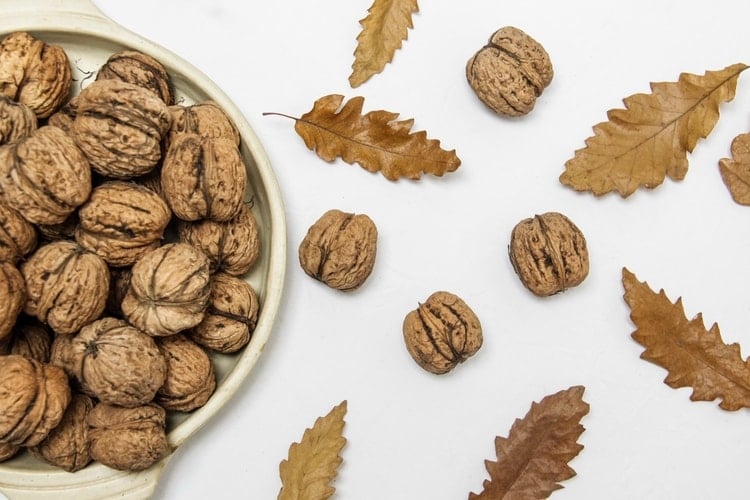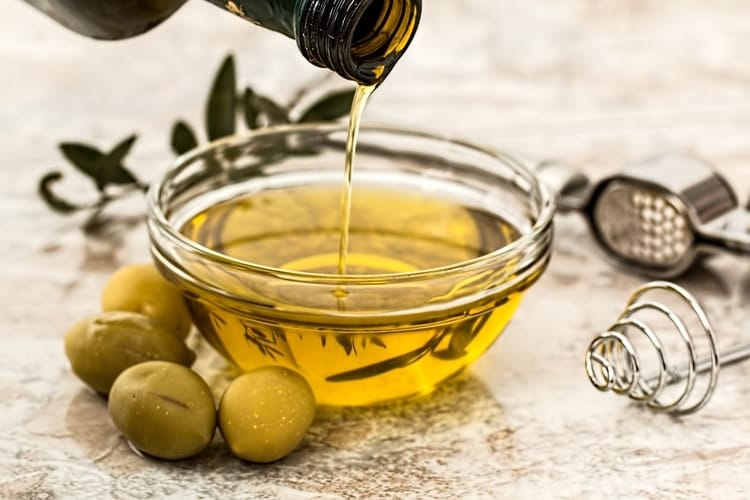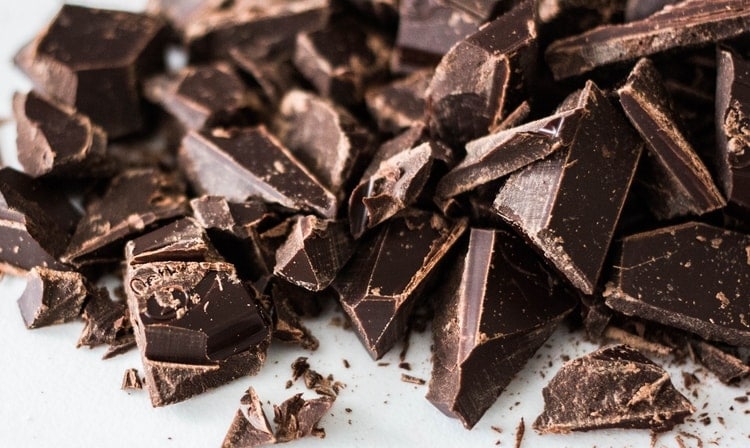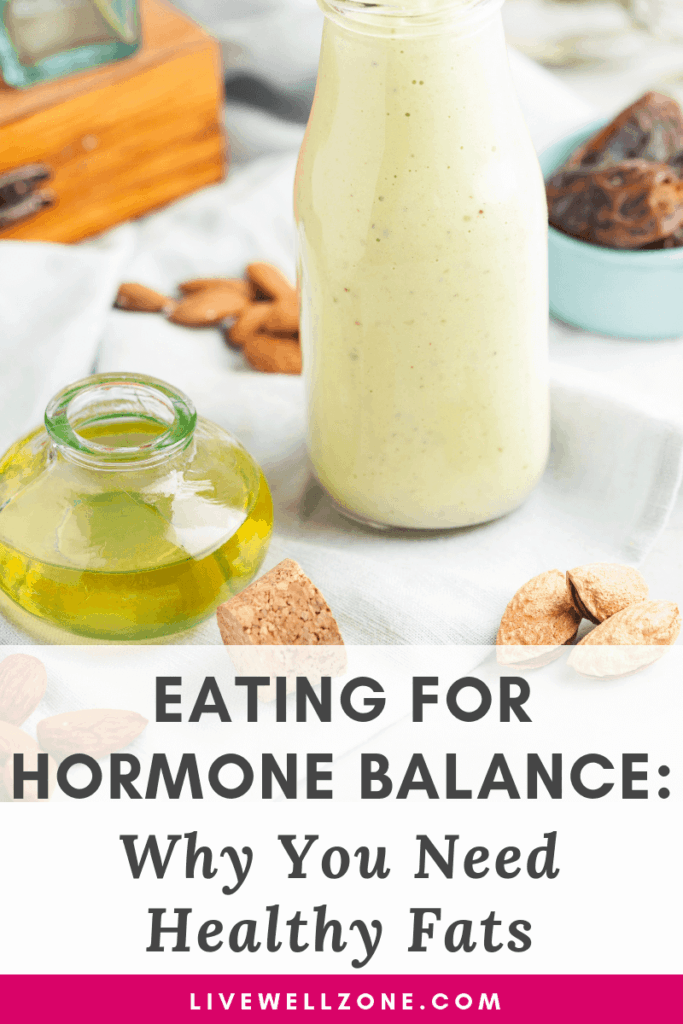
When you decide to start eating for hormone balance, it can be tricky knowing what to do with fatty foods.
After all, there has long been a belief that fat clogs arteries, raises cholesterol and makes us fat.
Yet, everywhere you turn, there is more and more talk about the importance of eating “healthy fats.”
All of this can make things very confusing (especially if you are trying to balance hormones and lose weight!).
In this post, my goal is to simplify the whole mess for you!
We will look at how fat affects our hormones and I will break down which fats you should be eating for hormone balance.
THE IMPORTANCE OF FAT IN HORMONAL IMBALANCE TREATMENT
Do you have erratic periods (or no period at all)?
Are you struggling with infertility?
Do you often feel tired and sluggish?
Are you easily irritable and impatient?
Do you have a hard time losing weight?
Is brain fog a recurring issue for you?
If you answered yes, to any of the above, then one of the main nutrients that you want to make sure you’re eating daily is fat – specifically from whole foods.
So, why is it that a lack of healthy fats can lead to symptoms of hormone imbalance?
Well, it all boils down to the fact that a lot of our hormones are fat-based.
Fat and cholesterol are the building blocks that the body uses to make hormones, such as:
- Estrogens: Produced mainly by the ovaries and adrenals, estrogens include hormones like estradiol and estrone.
- Corticosteroids: These are hormones produced by the adrenal glands, such as cortisol, DHEA, corticosterone and aldosterone (which regulates the levels of water and salt, ultimately essential in regulating blood pressure).
- Progestagens: These are hormones that bind to, and activate, the progesterone receptor. Progesterone is the main progestagen.
- Androgens: Produced in the ovaries and adrenals, androgens includes hormones like testosterone, DHEA and DHEAS.
As you can see, there are a lot of critical hormones that rely on fat (and by extension, cholesterol)!
Balancing hormones is like building a house.
There are various things that go into creating a solid foundation for house.
Similarly, there are various things that go into laying a solid foundation for hormone balance.
In this case it’s about purposefully eating for hormone balance! And healthy fats are a key component.
Other Benefits of Healthy Fats

The best part about purposefully eating for hormone balance is that you automatically improve other aspects of your health in the process.
That’s because the body needs healthy fats for tons of other processes.
For example, healthy fats:
- reduce sugar cravings (check out this article for more of my tips on how to reduce sugar cravings).
- improve skin health.
- lower inflammation.
- heal leaky gut.
- reduce the risk of heart disease.
- prevent insulin resistance.
- strengthen brain and cognitive function (the brain is approximately 60% fat!).
- regulate cholesterol and blood pressure.
- maintain overall cell health.
- support weight loss.
Let’s talk for a minute about that last item: “support weight loss.”
Once upon a time, many of us were taught that eating fat leads to weight gain. But the reality it this:
- There are studies, such as this one, showing that people who eat a diet that is high in healthy fats, actually increase their metabolism.
- There are hormones, such as leptin, that tell the body when it is time to stop eating. But unfortunately, there are hormone disruptors, such as the one I discuss here, that can totally mess up leptin signals. And that means you can find yourself eating nonstop!
- Furthermore….when it comes to triggering the body’s “willingness” to store fat, it is actually refined sugar and refined carbs that are the culprits.
This last part is super important because refined sugars (which includes those refined carbs) create a spike in insulin levels.
This leads to all of the food (in its broken down form) that is in the bloodstream to be transferred to your fat cells.
When this happens, the brain also triggers you to eat more.
In addition, when we try to lose weight by cutting calories and exercising more, the body freaks out.
It thinks we are going into starvation mode. With the fear of starvation looming, the body converts everything we do eat into, you guessed it, fat!
Whew!
The important thing to note here is that the body doesn’t look at calories first.
Rather, the body looks for nutrients.
When the nutrients it needs are present, it is happy.
However, when essential nutrients are missing, it is not happy (and honestly, neither are you!).
4 TYPES OF FATS FOR YOUR HORMONE BALANCING DIET PLAN

Before we talk about the specific foods that you need when eating for hormone balance, there are 4 main groups of fats that you should be aware of.
These are:
- Monounsaturated fat
- Essential fatty acids
- Saturated fats
- Cholesterol
1. Monounsaturated Fats
These fats are great for healthy brain function and they can can help alleviate hormone imbalance symptoms like brain fog or difficulty focusing.
Monounsaturated fats also regulate blood pressure and cholesterol levels.
Oils like olive oil, sesame oil, flaxseed oil and sunflower oil are all monounsaturated fats.
In addition, avocado and nuts are also high in monounsaturated fats.
2. Essential Fatty Acids (EFAs)
The term “essential” in “essential fatty acids” comes from the fact that our bodies can’t make them.
This means when we are eating for hormone balance, we have to include foods that contain these fatty acids.
The two main EFAs that can strongly impact hormone health are:
- omega-3 fatty acids.
- omega-6 fatty acids.
Omega-3’s are known to fight inflammation, support brain function and improve circulation.
As for omega-6’s, they are necessary for growth and development, as well as brain health.
Even though omega-6s are necessary for our health, consuming high quantities of them causes chronic inflammation.
Ideally, the ratio of omega 6 to omega 3 in our diet should be 4:1 or 1:1.
However, the typical American diet usually results in a ratio of 12:1.
In extreme cases, that ratio can even be 25:1.
That means many Americans eat 25 times more omega 6 than omega 3!
Given these numbers, it’s no surprise that chronic inflammation is a major problem these days.
3. Saturated Fats
These are the easiest fats for the body to break down. This means that saturated fats are excellent for anyone with digestive or gut health issues.
In addition, saturated fats are necessary for bone health, liver health and brain function.
Furthermore, saturated fats support the immune system, help with weight loss and regulate cholesterol levels.
4. Cholesterol
Even though cholesterol is often demonized, it’s actually very important for our health.
In fact, cholesterol is so important that the liver produces 80 – 90% of it!
That is no mistake. You read that correctly.
Now, if cholesterol really was so bad for us, would the liver be naturally programmed to produce so much of it?Probably not!
So when it comes to ensuring healthy levels of cholesterol production, the main goal is to keep your liver healthy.
A healthy liver produces healthy quantities of cholesterol. There are very specific things that you can do to improve your liver health and I outline all of them in this post.
As for cholesterol-containing foods like eggs, feel free to enjoy them if that’s your thing (just make sure there are organic, hormone-free and antibiotic-free).
It is also worth noting that the liver adjusts its production of cholesterol based on how much cholesterol take from food.
So, if we eat more cholesterol-containing foods, the liver reduces how much cholesterol it makes. This keeps things in balance
Don’t you just love how smart the body is? 🙂
Before we wrap up this section, one little note: no food has only monounsaturated fat or only cholesterol.
All foods have a mix.
So, when an oil is said to be monounsaturated, it simply means that it has higher proportions of monounsaturated fat. But it still has other types of fat too.
Basically, nature has done all the math for you and balanced things out for you.
All you have to do is eat from the rainbow of real, whole food 🙂
EATING FOR HORMONE BALANCE: THE BEST FATS TO ADD TO YOUR DIET

Now that you know about the importance of fat for hormones, as well as types of fats to look out for, it’s to focus on the essential foods to include in your diet.
Here we’re going to prioritize the foods that give you the most bang for your buck.
And that means eating more plant fats and less animal fats.
The main reason for this is that animal fats often contain growth hormones, antibiotics and other toxins.
And sometimes they also have pesticides.
That’s A LOT of junk for the body and it’s really hard to get your hormones in balance when it constantly has to fight off toxins. I mean, how exhausting!
So load up on plant fats.
As for animal products, eat as little as possible. And when you do invest in getting organic, hormone-free, antibiotic-free, grass fed varieties.
In the case of fish, invest in wild-caught.
I say “invest” because taking good care of yourself now will pay off for decades to come. If you don’t invest in yourself, then who else will?
Ok, here are the best fats to add to your diet when eating for hormone balance.
Feel free to mix ‘n match them depending on your taste preference 🙂
- Chia seeds
- Flax seeds
- Pistachios
- Cashews
- Walnuts
- Peanuts
- Macadamia nuts
- Hazelnuts
- Hemp seeds
- Sunflower seeds
- Pumpkin seeds
- Dark chocolate (at least 70%)
- Sunflower seed butter
- Almond butter
- Peanut butter
- Fresh coconuts
- Salmon (wild-caught)
- Mackerel (wild-caught)
- Sardines (wild-caught)
- Herring (wild-caught)
- Mustard seeds
- Olives
- Anchovies
- Ghee
- Grapeseed oil
- Sesame oil
- Coconut oil
- Palm oil
- Olive Oil
- Avocado oil
- Macadamia nut oil
- Walnut Oil
- Nut milk (e.g. coconut milk, almond milk and so on)
- Lard (must be organic, grass-fed, grass-finished, hormone-free, antibiotic-free)
- Butter (must be organic, grass-fed, grass-finished, hormone-free, antibiotic-free)
- Eggs (Pasture-raised, hormone-free, antibiotic-free eggs)
A Word About Trans Fats
When it comes to trans fat or hydrogenated fat, just say NO.
Trans fats are linked to endocrine disruption, obesity, cognitive decline and chronic illnesses.
There’s simply nothing good about them.
Although small amounts of trans fats do occur naturally in some meats, most of the trans fats that we’re exposed to is processed and 100% unnatural.
As for the trans fat that is in meat, it’s in very small quantities that doesn’t damage the body.
I hope this post helped you get more clarity on the role of fats for our hormones. Fat really isn’t the enemy (unless it’s been processed and turned into some sort of franken-fat!).



